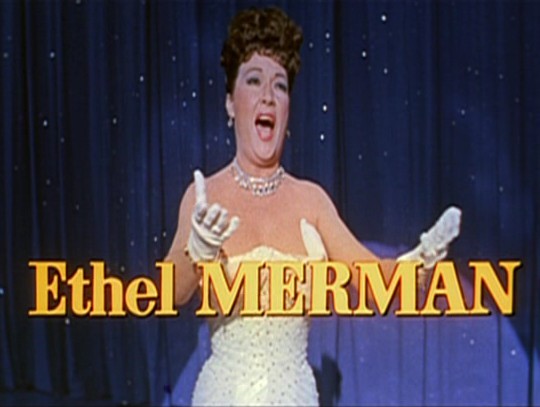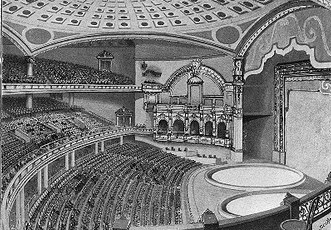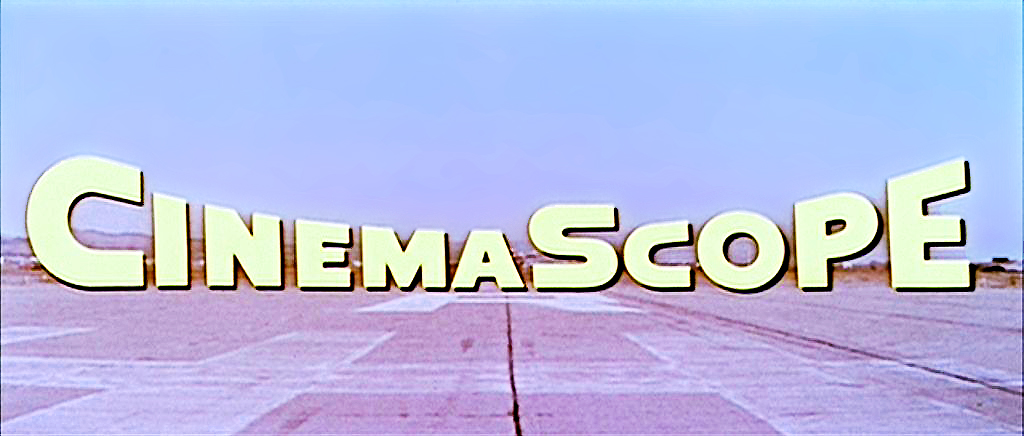|
There's No Business Like Show Business (film)
''Irving Berlin's There's No Business Like Show Business'' is a 1954 American musical comedy-drama film directed by Walter Lang. It stars an ensemble cast, consisting of Ethel Merman, Donald O'Connor, Marilyn Monroe, Dan Dailey, Johnnie Ray, and Mitzi Gaynor. The title is borrowed from the famous song in the stage musical (and MGM film) '' Annie Get Your Gun''. The screenplay was written by Phoebe Ephron and Henry Ephron, based on a story by Lamar Trotti; and the movie was Fox's first musical in CinemaScope and DeLuxe Color. O'Connor later called the film the best picture he ever made. Summary The story opens in 1919 and chronicles the ups and downs in the careers of Terence and Molly Donahue, a husband-and-wife vaudeville team. Throughout the years, the Donahues reconcile a stable family life with professional success. Their children, Steve, Katy, and Tim, join the act one by one, and they eventually become known as The Five Donahues. However, as the children mature, they ... [...More Info...] [...Related Items...] OR: [Wikipedia] [Google] [Baidu] |
Walter Lang
Walter Lang (August 10, 1896 – February 7, 1972) was an American film director. Early life Walter Lang was born in Tennessee. As a young man he went to New York City where he found clerical work at a movie studio, film production company. The business piqued his artistic instincts and he began learning the various facets of filmmaking and eventually worked as an assistant director. However, Lang also had ambitions to be a painter and left the United States for a time to join the great gathering of artists and writers in the Montparnasse Quarter of Paris, France. Things did not work out as Lang hoped and he eventually returned home and to the film business. Career In 1925, Walter Lang directed his first silent film, ''The Red Kimono''. In the mid-1930s, he was hired by 20th Century Fox where, as a director, he "painted" a number of the spectacular colorful musicals for which Fox Studios became famous for producing during the 1940s. One of Lang's most recognized films is the lav ... [...More Info...] [...Related Items...] OR: [Wikipedia] [Google] [Baidu] |
Musical Film
Musical film is a film genre in which songs by the characters are interwoven into the narrative, sometimes accompanied by dancing. The songs usually advance the plot or develop the film's characters, but in some cases, they serve merely as breaks in the storyline, often as elaborate "production numbers". The musical film was a natural development of the stage musical after the emergence of sound film technology. Typically, the biggest difference between film and stage musicals is the use of lavish background scenery and locations that would be impractical in a theater. Musical films characteristically contain elements reminiscent of theater; performers often treat their song and dance numbers as if a live audience were watching. In a sense, the viewer becomes the diegetic audience, as the performer looks directly into the camera and performs to it. With the advent of sound in the late 1920s, musicals gained popularity with the public and are exemplified by the films of Busby Ber ... [...More Info...] [...Related Items...] OR: [Wikipedia] [Google] [Baidu] |
New York Hippodrome
The Hippodrome Theatre, also called the New York Hippodrome, was a theater in New York City from 1905 to 1939, located on Sixth Avenue between West 43rd and West 44th Streets in the Theater District of Midtown Manhattan. It was called the world's largest theatre by its builders and had a seating capacity of 5,300,Shanor with a 100x200ft (30x61m) stage. The theatre had state-of-the-art theatrical technology, including a rising glass water tank. The Hippodrome was built by Frederic Thompson and Elmer "Skip" Dundy, creators of the Luna Park amusement park at Coney Island, with the backing of Harry S. Black's U.S. Realty, a dominant real estate and construction company of the time,Alexiou and was acquired by The Shubert Organization in 1909. In 1933, it was re-opened as the New York Hippodrome cinema, and became the stage for Billy Rose's ''Jumbo'' in 1935. Acts which appeared at the Hippodrome included numerous circuses, musical revues, Harry Houdini's disappearing elephant, va ... [...More Info...] [...Related Items...] OR: [Wikipedia] [Google] [Baidu] |
Seminary
A seminary, school of theology, theological seminary, or divinity school is an educational institution for educating students (sometimes called ''seminarians'') in scripture, theology, generally to prepare them for ordination to serve as clergy, in academics, or mostly in Christian ministry. The English word is taken from the Latin ''seminarium'', translated as ''seed-bed'', an image taken from the Council of Trent document ''Cum adolescentium aetas'' which called for the first modern seminaries. In the United States, the term is currently used for graduate-level theological institutions, but historically it was used for high schools. History The establishment of seminaries in modern times resulted from Roman Catholic reforms of the Counter-Reformation after the Council of Trent. These Tridentine seminaries placed great emphasis on spiritual formation and personal discipline as well as the study, first of philosophy as a base, and, then, as the final crown, theology. The oldest C ... [...More Info...] [...Related Items...] OR: [Wikipedia] [Google] [Baidu] |
Vaudeville
Vaudeville (; ) is a theatrical genre of variety entertainment born in France at the end of the 19th century. A vaudeville was originally a comedy without psychological or moral intentions, based on a comical situation: a dramatic composition or light poetry, interspersed with songs or ballets. It became popular in the United States and Canada from the early 1880s until the early 1930s, but the idea of vaudeville's theatre changed radically from its French antecedent. In some ways analogous to music hall from Victorian Britain, a typical North American vaudeville performance was made up of a series of separate, unrelated acts grouped together on a common bill. Types of acts have included popular and classical musicians, singers, dancers, comedians, trained animals, magicians, ventriloquists, strongmen, female and male impersonators, acrobats, clowns, illustrated songs, jugglers, one-act plays or scenes from plays, athletes, lecturing celebrities, minstrels, and movies. A ... [...More Info...] [...Related Items...] OR: [Wikipedia] [Google] [Baidu] |
AllMovie
AllMovie (previously All Movie Guide) is an online database with information about films, television programs, and screen actors. , AllMovie.com and the AllMovie consumer brand are owned by RhythmOne. History AllMovie was founded by popular-culture archivist Michael Erlewine, who also founded AllMusic and AllGame. The AllMovie database was licensed to tens of thousands of distributors and retailers for point-of-sale systems, websites and kiosks. The AllMovie database is comprehensive, including basic product information, cast and production credits, plot synopsis, professional reviews, biographies, relational links and more. AllMovie data was accessed on the web at the AllMovie website. It was also available via the AMG LASSO media recognition service, which can automatically recognize DVDs. In late 2007, TiVo Corporation acquired AMG for a reported $72 million. The AMG consumer facing web properties AllMusic.com, AllMovie.com and AllGame.com were sold by Rovi in August 2013 ... [...More Info...] [...Related Items...] OR: [Wikipedia] [Google] [Baidu] |
DeLuxe Color
DeLuxe Color or Deluxe color or Color by DeLuxe is Deluxe Laboratories brand of color process for motion pictures. DeLuxe Color is Eastmancolor-based, with certain adaptations for improved compositing for printing (similar to Technicolor's "selective printing") and for mass-production of prints. Eastmancolor, first introduced in 1950, was one of the first widely-successful "single strip color" processes, and eventually displaced three-strip Technicolor. DeLuxe also offers "Showprints" (usually supplied to premieres in Los Angeles and New York). "Showprint" is DeLuxe's proprietary name for an "EK" (for "Eastman Kodak"), the generic name for a release print made directly from the original camera negative instead of from an internegative. See also * Deluxe Entertainment Services Group * Alan E. Freedman * Sol M. Wurtzel * Metrocolor * List of color film systems This is a list of color film processes known to have been created for photographing and exhibiting motion pictures in c ... [...More Info...] [...Related Items...] OR: [Wikipedia] [Google] [Baidu] |
CinemaScope
CinemaScope is an anamorphic lens series used, from 1953 to 1967, and less often later, for shooting widescreen films that, crucially, could be screened in theatres using existing equipment, albeit with a lens adapter. Its creation in 1953 by Spyros P. Skouras, the president of 20th Century Fox, marked the beginning of the modern anamorphic format in both principal 2.55:1, almost twice as wide as the previously common Academy format's 1.37:1 ratio. Although the technology behind the CinemaScope lens system was made obsolete by later developments, primarily advanced by Panavision, CinemaScope's anamorphic format has continued to this day. In film-industry jargon, the shortened form, 'Scope, is still widely used by both filmmakers and projectionists, although today it generally refers to any 2.35:1, 2.39:1, 2.40:1, or 2.55:1 presentation or, sometimes, the use of anamorphic lensing or projection in general. Bausch & Lomb won a 1954 Oscar for its development of the CinemaScope l ... [...More Info...] [...Related Items...] OR: [Wikipedia] [Google] [Baidu] |
IMDb
IMDb (an abbreviation of Internet Movie Database) is an online database of information related to films, television series, home videos, video games, and streaming content online – including cast, production crew and personal biographies, plot summaries, trivia, ratings, and fan and critical reviews. IMDb began as a fan-operated movie database on the Usenet group "rec.arts.movies" in 1990, and moved to the Web in 1993. It is now owned and operated by IMDb.com, Inc., a subsidiary of Amazon. the database contained some million titles (including television episodes) and million person records. Additionally, the site had 83 million registered users. The site's message boards were disabled in February 2017. Features The title and talent ''pages'' of IMDb are accessible to all users, but only registered and logged-in users can submit new material and suggest edits to existing entries. Most of the site's data has been provided by these volunteers. Registered users with a prov ... [...More Info...] [...Related Items...] OR: [Wikipedia] [Google] [Baidu] |
Annie Get Your Gun (musical)
''Annie Get Your Gun'' is a musical with lyrics and music by Irving Berlin and a book by Dorothy Fields and her brother Herbert Fields. The story is a fictionalized version of the life of Annie Oakley (1860–1926), a sharpshooter who starred in ''Buffalo Bill's Wild West'', and her romance with sharpshooter Frank E. Butler (1847–1926). The 1946 Broadway production was a hit, and the musical had long runs in both New York (1,147 performances) and London, spawning revivals, a 1950 film version and television versions. Songs that became hits include " There's No Business Like Show Business", " Doin' What Comes Natur'lly", "You Can't Get a Man with a Gun", "They Say It's Wonderful", and "Anything You Can Do (I Can Do Better)". History and background Dorothy Fields had the idea for a musical about Annie Oakley, to star her friend, Ethel Merman. Producer Mike Todd turned the project down, so Fields approached a new producing team, Richard Rodgers and Oscar Hammerstein II. Afte ... [...More Info...] [...Related Items...] OR: [Wikipedia] [Google] [Baidu] |


.jpg)



